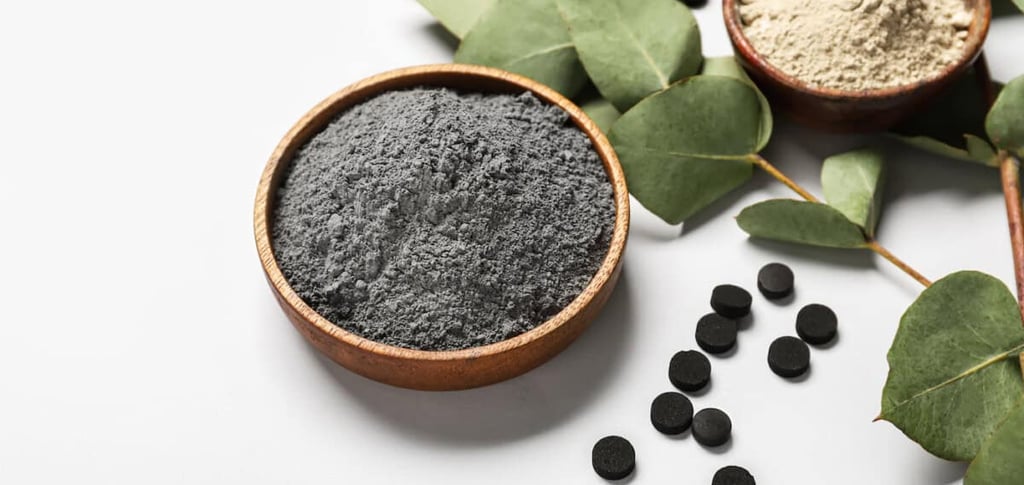Activated Charcoal: The Ultimate Guide to Its Benefits
Discover the incredible benefits of activated charcoal for health, beauty, and home. Learn how to use it safely and effectively.
WELLNESSHEALTHBLOG-LIST
1/31/20254 min read


Activated charcoal, also known as activated carbon, has become a staple in the world of wellness. From detoxification to skincare, its applications are multiple and surprising. But what makes this black material so special? How can you use it wisely and fully enjoy its virtues? This article reveals everything you need to know about activated charcoal, drawing on scientific sources and expert advice. Prepare to be amazed by the many facets of this ancient natural remedy!
Table of Contents
What is Activated Charcoal?
Proven Health Benefits of Activated Charcoal
Activated Charcoal for Radiant Skin
Household Uses for Activated Charcoal
How to Use Activated Charcoal Safely
FAQ on Activated Charcoal
Conclusion
In a Nutshell
Activated charcoal is a powerful adsorbent, capable of capturing toxins and impurities.
It is used to treat poisoning, improve digestion, whiten teeth, and purify the skin.
There are different forms of activated charcoal (powder, capsules, tablets) to choose from depending on the intended use.
It is important to respect the dosages and consult a healthcare professional if in doubt.
1. What is Activated Charcoal?
Activated charcoal is a form of carbon that has been processed to increase its porosity. This increased porosity gives it an immense adsorption surface area. Adsorption (not to be confused with absorption) is the ability of a substance to bind molecules to its surface. It is obtained by heating carbon-rich organic materials such as wood, coconut shells, or peat at high temperatures in the presence of a gas (source: Journal of Hazardous Materials, 2005). This process creates a multitude of micropores that significantly increase its surface area, allowing it to act as a molecular sponge.
2. Proven Health Benefits of Activated Charcoal
Treatment of Poisoning and Overdoses: This is the most recognized medical use of activated charcoal. It is used in hospitals to adsorb ingested toxic substances, thus reducing their absorption by the body (source: British Journal of Clinical Pharmacology, 2002). In the US, poison control centers commonly use it.
Reduction of Bloating and Intestinal Gas: Activated charcoal can help relieve digestive discomfort by capturing gases produced during digestion. A study published in The American Journal of Gastroenterology (1986) showed a significant reduction in flatulence after taking activated charcoal.
Cholesterol Control: Some studies suggest that activated charcoal may help lower LDL ("bad") cholesterol levels by binding to bile acids in the intestine, promoting their elimination (source: The Lancet, 1989). Further research is needed to confirm this effect.
3. Activated Charcoal for Radiant Skin
Purifying Masks: The adsorption capacity of activated charcoal makes it an excellent ingredient for face masks. It helps to remove impurities, excess sebum, and blackheads, leaving the skin clean and purified. Beauty bloggers in France, the US, and other countries love it!
Acne Treatment: By eliminating bacteria and toxins on the skin's surface, activated charcoal can help reduce inflammation and breakouts associated with acne. However, be careful with sensitive skin; a patch test is recommended.
Teeth Whitening: Activated charcoal, used with caution, can help remove surface stains on teeth, making them appear whiter. Be aware that it does not replace professional whitening and can be abrasive if used too frequently. The American Dental Association (ADA) recommends caution.
4. Household Uses for Activated Charcoal
Air and Water Purification: Activated charcoal is used in water filters and air purifiers to remove contaminants, odors, and chemicals. Water filter pitchers using activated charcoal are widely available.
Natural Deodorizer: Placed in a refrigerator, closet, or room, activated charcoal can absorb unpleasant odors. It's a natural alternative to chemical air fresheners.
Pet Odor Reduction: Activated charcoal granules placed near pet litter boxes can help control unpleasant odors.
5. How to Use Activated Charcoal Safely
Dosage: The recommended dosage varies depending on the use. Follow the manufacturer's instructions or consult a healthcare professional.
Hydration: It is important to drink plenty of water when taking activated charcoal, as it can lead to dehydration.
Drug Interactions: Activated charcoal can interfere with the absorption of certain medications. Take it at a distance from your medications (at least 2 hours). Consult your doctor or pharmacist if in doubt; this is a recommendation from the FDA (Food and Drug Administration in the USA) and the health authorities worldwide.
Side Effects: Although generally well-tolerated, activated charcoal can sometimes cause constipation or black stools.
6. FAQ on Activated Charcoal
Is activated charcoal dangerous for children? It can be used in children in case of poisoning, under medical supervision. For other uses, seek the advice of a pediatrician.
Can you use activated charcoal every day? Daily use is generally not recommended, unless advised by a doctor. It is best used occasionally.
What is the difference between vegetable activated charcoal and wood activated charcoal? The main difference lies in the raw material used. Vegetable activated charcoal can come from various plant sources, such as coconut. Their effectiveness is comparable.
Where to buy activated charcoal? It can be found in pharmacies, drugstores, health food stores, and online. Make sure to choose a quality product, ideally from a controlled origin.
7. Conclusion
Activated charcoal is a natural remedy with multiple virtues, validated by science and used for centuries. Whether it's to improve your health, beautify your skin, or purify your environment, it offers a natural and effective solution. Feel free to incorporate it into your wellness routine, respecting the precautions for use. And you, have you already tried activated charcoal? Share your experience and tips in the comments below! Don't hesitate to share this article on social media to help others discover the benefits of activated charcoal.
